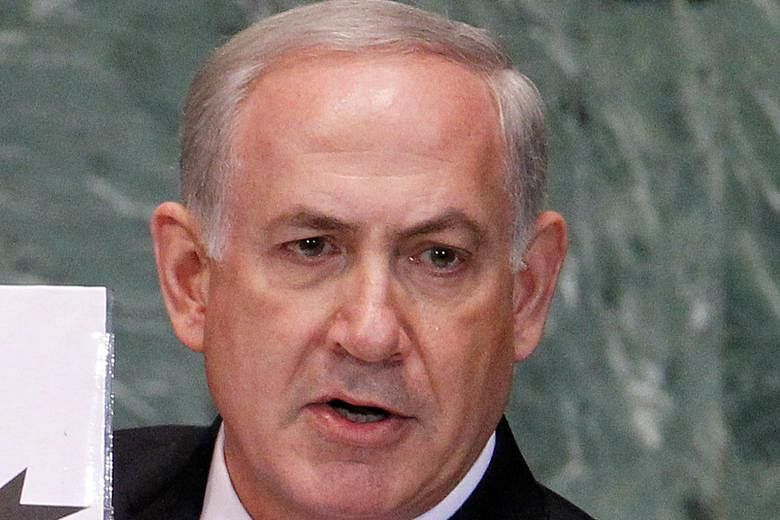Tomorrow, Israel will vote. The race is close. Prime Minister Benjamin Netanyahu and opposition leader Benny Gantz are neck and neck in the polls.
Mr Netanyahu's chances of forming a stable coalition after Israel's second parliamentary elections this year appear slim. This could result in him being deposed, just as he is about to face charges of corruption, spelling the end of his political career.
No wonder he has been pulling out all the stops in the final stretch of this campaign to try to dominate the public discourse.
Last week, to the dismay of the government's legal adviser, Mr Netanyahu tried to pass a law that would have allowed parties to film voters in polling stations. When this plan failed, he revealed the existence of a previously unknown Iranian nuclear facility which, however, has been standing still for years.
When this did not gain enough traction in the media, his Likud party invited the press for what it promised would be a "dramatic announcement". At the event, he announced what came as a surprise, even to some of his ministers.
Israel had "an opportunity offered only once in a lifetime", said the Prime Minister. If voters were to give him a clear mandate, he would immediately annex parts of the occupied West Bank. "Today, I announce my intention to apply Israeli sovereignty over the Jordan Valley and the Northern Dead Sea upon the establishment of the next government. This will be the first step, if I gain your trust," he said.
An annexation of the Jordan Valley would have far-reaching consequences for Israelis and Palestinians. It would be the most important legacy of Mr Netanyahu's tenure, the longest in Israel's history.
Yesterday, he announced a new settlement in the West Bank.
Since the founding of the state 75 years ago, Israel has been battling for recognised borders. Only the border with Egypt and parts of the border with Jordan have been laid down in peace treaties and are internationally recognised. A ceasefire line separates Israel from Lebanon and Syria, which remain in a state of war with the Jewish state.
The West Bank was first conquered by Jordan in 1948. In 1949, an armistice line with Israel was marked with a green pen. Today, Palestinians claim everything east of this "green line" for their future state, with the Jordan Valley playing a key role in their designs.
Its fertile soil would make it the bread basket of a Palestinian state. But for Israelis, the valley is of paramount strategic significance as well. Until conquering it during the Six-Day War in 1967, Israel was barely 20km across at its narrowest point, making it extremely vulnerable to terror attacks or military invasions.
Keeping the Jordan Valley would give Israel strategic depth, which is why Israeli negotiators have insisted for decades their country be granted a long-term military presence there. Mr Netanyahu now wants to go a step further: The valley should become Israel's "eastern defensive wall", guaranteeing that the country "will never again be only a few kilometres wide".
Israel's army "must remain in the entire Jordan Valley and not just a narrow strip near the water that is impossible to defend", he contended. For the Israel Defence Forces to remain there, it was "imperative that the Jordan Valley be under Israeli sovereignty", Mr Netanyahu stated. According to various estimates, he wants to annex 10 to 30 per cent of the West Bank, "with maximum coordination with the US". Such an annexation would cut any Palestinian state off from the outside world, rendering a two-state solution almost impossible.
But is Mr Netanyahu really serious? One person could have made a difference: United States President Donald Trump, whose diplomacy has upended the foundations of previous Middle East policy. Early last year, his administration reacted furiously when Mr Netanyahu claimed to be discussing annexation of the West Bank with Washington.
But meanwhile, Mr Trump has recognised Jerusalem as Israel's capital as well as the annexation of the Golan Heights. Now, his administration has responded to Mr Netanyahu's proposal with only the laconic, anonymous statement that US foreign policy has not changed. Anonymous sources say it did not run afoul of a peace plan the US has prepared and intends to publish after Israel's elections. Mr Netanyahu has hinted that this stance has been coordinated.
Most strikingly, the condemnation with which any other administration would have reacted to the idea of annexation never came. That could mean that Mr Netanyahu had already cleared his expansion project with Mr Trump.
But few Israelis believe that. Annexing the Jordan Valley may be part of the Israeli consensus. In a poll last month, 48 per cent of Jewish Israelis supported remaining in the valley. Even the main opposition party "Blue-White" wants to extend Israeli sovereignty to this area.
Among coalition partners of Mr Netanyahu's party, fear outweighed joy as they analysed his declaration. They suspect his main aim is to deprive them of voters, not lay down Israel's eastern border. So while settler leaders praised his statement as historical, they also voiced criticism. Some called it "cheap political spin", while others felt his promise did not go far enough.



